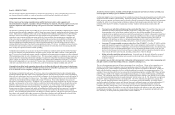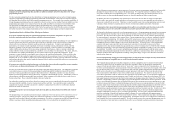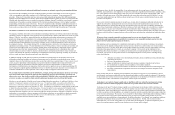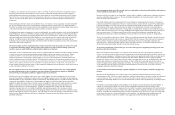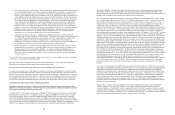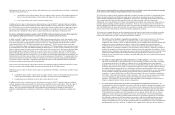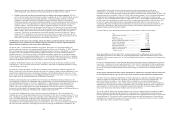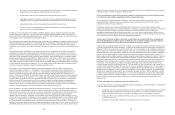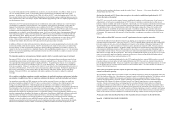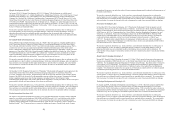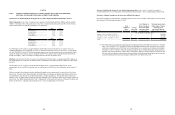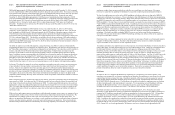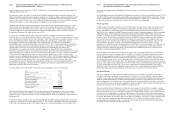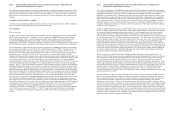Dish Network 2012 Annual Report Download - page 27
Download and view the complete annual report
Please find page 27 of the 2012 Dish Network annual report below. You can navigate through the pages in the report by either clicking on the pages listed below, or by using the keyword search tool below to find specific information within the annual report.42
42
As a result of the expiration of this prohibition on exclusivity, we may be limited in our ability to obtain access at
all, or on nondiscriminatory terms, to programming from programmers that are affiliated with cable system
operators. In addition, any other changes in the Cable Act, and/or the FCC’s rules that implement the Cable Act,
that currently limit the ability of cable-affiliated programmers to discriminate against competing businesses such as
ours, could adversely affect our ability to acquire cable-affiliated programming at all or to acquire programming on
non-discriminatory terms.
Furthermore, the FCC had imposed program access conditions on certain cable companies as a result of mergers,
consolidations or affiliations with programmers. The expiration of the exclusivity prohibition in the Cable Act
triggered the termination of certain program access conditions that the FCC had imposed on Liberty Media
(“Liberty”). In July 2012, similar program access conditions that had applied to Time-Warner expired as previously
scheduled. These developments may adversely affect our ability to obtain Liberty’s and Time-Warner’s
programming, or to obtain it on non-discriminatory terms. In the case of certain types of programming affiliated
with Comcast through its venture with General Electric, NBCUniversal, the prohibition on exclusivity will still
apply until January 2018. During that time, we have the right to subject the terms of access to NBCUniversal’s
programming to binding arbitration if we and the programmer cannot reach agreement on terms, subject to FCC
review. There can be no assurance that this procedure will result in favorable terms for us or that the FCC
conditions that establish this procedure will be prevented from expiring on their own terms.
In addition, affiliates of certain cable providers have denied us access to sports programming they feed to their cable
systems terrestrially, rather than by satellite. The FCC has held that new denials of such service are unfair if they
have the purpose or effect of significantly hindering us from providing programming to consumers. However, we
cannot be sure that we can prevail in a complaint related to such programming and gain access to it. Our continuing
failure to access such programming could materially and adversely affect our ability to compete in regions serviced
by these cable providers.
The injunction against our retransmission of distant networks, which is currently waived, may be reinstated.
Pursuant to STELA, we have been able to obtain a waiver of a court injunction that previously prevented us from
retransmitting certain distant network signals under a statutory copyright license. Because of that waiver, we may
once again provide distant network signals to eligible subscribers. To qualify for that waiver, we are required to
provide local service in all 210 local markets in the U.S. on an ongoing basis. This condition poses a significant
strain on our capacity. Moreover, we may lose that waiver if we are found to have failed to provide local service in
any of the 210 local markets. If we lose the waiver, the injunction could be reinstated. Furthermore, depending on
the severity of the failure, we may also be subject to other sanctions, which may include, among other things,
damages. Pursuant to STELA, our compliance with certain conditions of the waiver is subject to continued
oversight.
We are subject to significant regulatory oversight, and changes in applicable regulatory requirements, including
any adoption or modification of laws or regulations relating to the Internet, could adversely affect our business.
Our operations, particularly our DBS operations and our wireless spectrum licenses, are subject to significant
government regulation, primarily by the FCC and, to a certain extent, by Congress, other federal agencies and
foreign, state and local authorities. Depending upon the circumstances, noncompliance with legislation or
regulations promulgated by these entities could result in the suspension or revocation of our licenses or registrations,
the termination or loss of contracts or the imposition of contractual damages, civil fines or criminal penalties, any of
which could have a material adverse effect on our business, financial condition and results of operations.
Furthermore, the adoption or modification of laws or regulations relating to video programming, satellite services,
wireless communications, broadband, the Internet or other areas of our business could limit or otherwise adversely
affect the manner in which we currently conduct our business. If we become subject to new regulations or
legislation or new interpretations of existing regulations or legislation that govern Internet network neutrality, for
example, we may be required to incur additional expenses or alter our business model. The manner in which
legislation governing Internet network neutrality may be interpreted and enforced cannot be precisely determined,
which in turn could have an adverse effect on our business, financial condition and results of operations. You
43
43
should review the regulatory disclosures under the caption “Item 1. Business — Government Regulations” of this
Annual Report on Form 10-K.
Our business depends on FCC licenses that can expire or be revoked or modified and applications for FCC
licenses that may not be granted.
If the FCC were to cancel, revoke, suspend, restrict, significantly condition, or fail to renew any of our licenses or
authorizations, or fail to grant our applications for FCC licenses, it could have a material adverse effect on our
business, financial condition and results of operations. Specifically, loss of a frequency authorization would reduce
the amount of spectrum available to us, potentially reducing the amount of services available to our subscribers.
The materiality of such a loss of authorizations would vary based upon, among other things, the location of the
frequency used or the availability of replacement spectrum. In addition, Congress often considers and enacts
legislation that affects us and FCC proceedings to implement the Communications Act and enforce its regulations
are ongoing. We cannot predict the outcomes of these legislative or regulatory proceedings or their effect on our
business.
We are subject to digital HD “carry-one, carry-all” requirements that cause capacity constraints.
To provide any full-power local broadcast signal in any market, we are required to retransmit all qualifying
broadcast signals in that market (“carry-one, carry-all”). The FCC adopted digital carriage rules that required DBS
providers to phase in carry-one, carry-all obligations with respect to the carriage of full-power broadcasters’ HD
signals by February 17, 2013 in markets in which they elect to provide local channels in HD. We have met this
requirement in all applicable markets. In addition, STELA has imposed accelerated HD carriage requirements for
noncommercial educational stations on DBS providers that do not have a certain contractual relationship with a
certain number of such stations. We have entered into such contractual relationships with the requisite number of
PBS stations to comply with the requirements. The carriage of additional HD signals on our pay-TV service could
cause us to experience significant capacity constraints and prevent us from carrying additional popular national
programs and/or carrying those national programs in HD.
In addition, there is a pending rulemaking before the FCC regarding whether to require DBS providers to carry all
broadcast stations in a local market in both standard definition and HD if they carry any station in that market in
both standard definition and HD. If we were required to carry multiple versions of each broadcast station, we would
have to dedicate more of our finite satellite capacity to each broadcast station. We cannot predict the outcome or
timing of that rulemaking process.
There can be no assurance that there will not be deficiencies leading to material weaknesses in our internal
control over financial reporting.
We periodically evaluate and test our internal control over financial reporting to satisfy the requirements of Section
404 of the Sarbanes-Oxley Act. Our evaluation of internal control over financial reporting for 2012 did not include
the internal control of DBSD North America and TerreStar, which we acquired on March 9, 2012. We are
currently integrating policies, processes, people, technology and operations for each of the combined companies.
Management will continue to evaluate our internal control over financial reporting as we execute integration
activities. Except as discussed above, our management has concluded that our internal control over financial
reporting was effective as of December 31, 2012. If in the future we are unable to report that our internal control
over financial reporting is effective (or if our auditors do not agree with our assessment of the effectiveness of, or
are unable to express an opinion on, our internal control over financial reporting), investors, customers and business
partners could lose confidence in the accuracy of our financial reports, which could in turn have a material adverse
effect on our business, investor confidence in our financial results may weaken, and our stock price may suffer.
We may face other risks described from time to time in periodic and current reports we file with the SEC.
Item 1B. UNRESOLVED STAFF COMMENTS
None.


